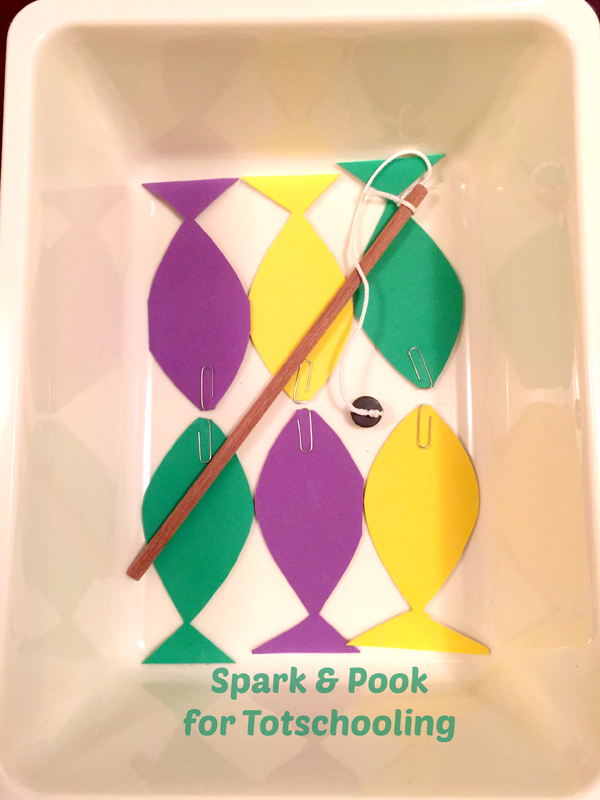Gone Fishing Game
For my daughter’s third birthday party, I put together a game I call “Gone Fishing” using simple materials I happened to have around the house. The game was such a hit with Pooky and the other kids that I decided to share it with you. The game is quick to set up and provides oodles of educational fun (a win-win in my book).What you will need:
- Gone Fishing Printable (or draw your own simple fish outlines)
- small dowel rod (you can also use a wooden spoon or unsharpened pencil)
- baker's twine, yarn, or some form of thick string (about 10-12 inches in length for each "fishing pole")
- construction paper or foam sheets in a variety of colors
- paper clips (one per fish)
- dot magnets
- a "pond" of some sort in which to place the fish
Assembly:
1 - Make the fish. I wanted more durable fish, so I printed the Gone Fishing Printable onto plain paper and then used that to trace and cut foam fish in a few different colors. If you don't have or want to use foam, just print the fish onto colored construction paper, and then cut them out. I created a total of nine fish for our game, but you can make as many as you'd like.
2 - Once the fish are cut out, attach a paperclip to each fish in the place where a mouth would go.
3 - Assemble the fishing pole by tying a double knot of one end of the string to one end of the dowel rod (or the straight end of a wooden spoon). Using the other end of the string, tie a double knot around the dot magnet. (If using foam fish for the game, use two dot magnets together instead of one.)
4 - Place the fish inside their bucket (or makeshift pond).
Ways to Play:
- Since we had multiple players ranging from ages 2-3, I made a "fishing pole" for each fisher. The initial goal was simply for each child to "catch" a fish with their "fishing pole" (without touching the fish with their hands). For toddlers, this takes a good deal of concentration and coordination. Pooky and her friends played this game repeatedly taking turns to catch the 9 fish.
- Once children become skilled at using the "fishing pole," challenge them further by asking them to fish for a specific color. (This takes greater hand-eye coordination.)
- You can practice other skills by drawing shapes, numbers, or letters onto the fish and asking the child to "fish" for specific ones. (To make the fish re-usable use a small sticky note instead of drawing directly onto the fish.) See the examples below.
- Write numbers on the fish (one on each) and have the child "fish" for the numbers in order. If they accidentally "catch" the wrong number, throw it back in.
- Draw some shapes that your child is familiar with on the fish so that there are multiples of each shape (i.e. three fish with a square, three fish with a circle, etc...) Create a landing spot for each type of fish so the child can sort their fish into the correct shape "bucket."
- Label the fish with some letters your child has been learning. Choose only a few letters and mark one fish with the capital letter and another fish with its corresponding lowercase letter. Then have the child fish for a specific letter and match the uppercase and lowercase into pairs.
Those are the ways we've been playing "Gone Fishing," but I'm sure there are many other ways you could play. Once Pooky knew how to play, we turned it into a Busy Bag activity. I take it out periodically and it's fun and educational all over again. You can find more busy bag ideas here.
Skills addressed with this activity:
- gross motor: hand-eye coordination
- social skills: taking turns
- math: counting, sorting, ordering, matching
- literacy: letter identification
Happy Fishing!
Meet Tiffiny:
I am a certified elementary school teacher turned stay-at-home mom. I’m a foodie, traveler, and avid reader. I love to share these joys with my husband, daughter, and the blogosphere. On my blog, Spark and Pook, you will find tips for traveling with children, children’s book reviews, and learn-though-play activities for toddlers and preschoolers.





Tidak ada komentar:
Posting Komentar